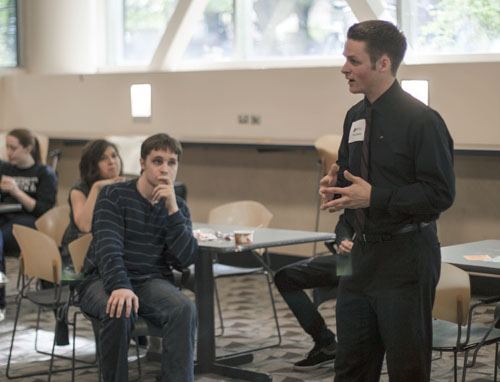
Associated Students of Portland State University President Harris Foster and a student government committee have begun filling executive staff positions amid concerns of cronyism within the hiring process.
The Vanguard spoke to several student government members who had complaints about the process but wished to remain anonymous.
“During the campaign [Foster] told certain people that they didn’t have to compete for their positions,” one student government member said. “It does raise ethical issues about cronyism.”
Foster was elected in May along with vice presidential running mate Yesenia Silva-Hernandez in a weakly contested campaign with only one challenger, James Au. Foster and Silva-Hernandez received 287 of the 569 votes cast.
Portland State’s enrollment sits at 29,703 for the 2012–13 school year. The 569 votes cast in the ASPSU election represent a *3 percent voter turnout, down from last year’s 9.3 percent turnout. The ASPSU constitution does not include any rules for the student government hiring process. According to Foster, he and his administration placed an emphasis on being open to scrutiny while interviewing for the positions.
“We wanted to have a more transparent process,” Foster said. Foster convened a hiring committee comprising Silva-Hernandez, former University Affairs Director Thomas Worth, former Legislative Affairs Director Dave Coburn and Oregon Student Association Campus Organizer for PSU Courtney Helstein.
“It was a deliberative process involving people that I…trust,” Foster said of the committee. The deadline for applications was May 22. For the staff positions, Foster and his hiring committee interviewed the applicants and then deliberated as a group, choosing what Foster said was the most qualified applicant for each. Executive cabinet positions required nominations and senate approval.
Discussing the applicant pool, Foster said, “I wanted to leave it up to the committee because some of the people were my friends, some of the people were Yesenia’s friends [and] some of the people were Tom’s friends. I wanted an objective voice.”
But several members of student government have alleged that Harris pledged future cabinet and staff positions to campaign aides well before the election.
“He promised positions to people before he was elected,” said a student government member. “He didn’t have the authority to appoint anyone yet.”
When asked whether he ever explicitly offered jobs to staffers before the election, Foster responded that “the only [person] I said that to was Donovan Powell. I said it jokingly, but I seriously considered him for the position.”
Foster said that he and Powell, whom Foster called a “good friend,” talked before the election, and that Foster encouraged Powell to apply for the publications director position. Powell was named the publications director after an interview process that included one other candidate; the publications director was one of several positions to which only two or three candidates applied.
“We knew right off the bat we wanted him,” Foster said. “[Powell] is the definition of the best publications advisor that ASPSU could have.”
Foster said that Powell’s competition for the publications director job lacked the critical computer programming experience that Powell had, making Powell the stronger candidate. Powell did not respond to the Vanguard’s requests for comment.
Ellie McConnell, ASPSU’s former student life director, added that ASPSU reached out to find more applicants for the open positions.
“We put up flyers and posted that we were hiring on Facebook,” McConnell said. Foster admitted that he weighed a campaign staff member’s contribution to the race when he sought applicants for vacant staff positions.
“When getting someone to run with you, you don’t promise them things—but when you have someone running with you, there’s a political thing,” Foster said. “They need to think they have some buy-in.”
It’s not unusual for a newly elected politician to reward the staff members and volunteers who helped put him or her in office, according to Butch Oxendine, the president of the American Student Government Association.
“Let’s just look at national, state [and] local elections,” he said. “The president of the U.S. picks his Cabinet. They’re ultimately approved [by Congress], but the president chooses people…Is that unethical? I don’t know.”
According to Oxendine, the question is not whether a student body president should be allowed to promise a friend a job but whether “student government is going to be just like it was in the past.”
The insular nature of the hiring process at Portland State may simply be symptomatic of the lack of interest in student government on campus.
“At public universities, the average turnout is 10 percent,” Oxendine said, referring to Portland State’s *3 percent turnout rate for last month’s election. Oxendine called the ASPSU election turnout “terrible.”
“It says that people outside of a select few don’t care,” Oxendine said. “If I’m the president, I want to try and open that up. I want to say, ‘Student government’s not just cronies, not just a clique of nerdy kids who all they do is run for office.’ No, you want to represent the student body.”
Editor’s note: This story was updated on June 5 to correct several titles of former student government members and the voter turnout percentage.

